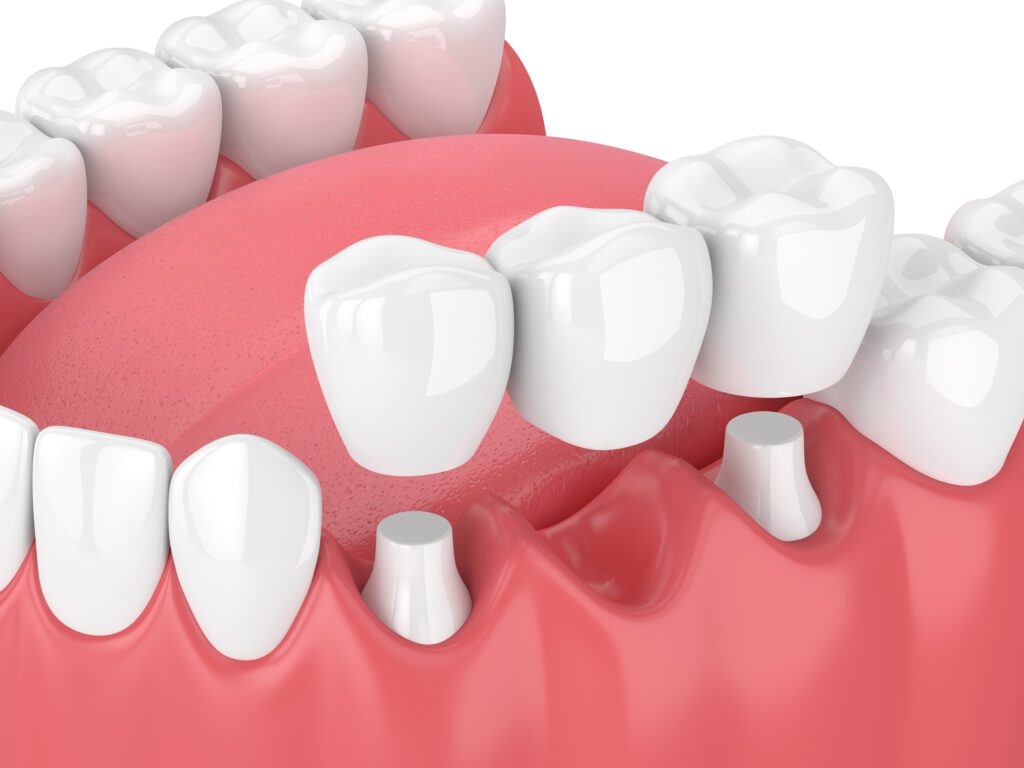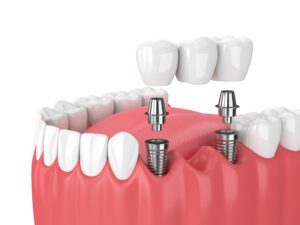Dental bridges are a common prosthetic solution to address missing teeth. They will help restore your oral function and the aesthetics of your smile. There are many reasons why people lose teeth, however, it is essential to replace them no matter how they are lost. A tooth bridge is a restorative dentistry solution that will restore oral health and quality of life for people with tooth loss. Dr. Keyshla Escobar with Huntsville Family Dental can provide a custom dental bridge in Huntsville, TX that offers functional and aesthetic benefits.


What is a Dental Bridge?
A dental bridge is a single-unit, fixed prosthesis that dentists use to replace missing teeth. They can replace a single tooth or several missing consecutive teeth. The bridge is secured in the patient’s mouth to either natural teeth or dental implants. The purpose of this dental restoration is to “bridge” the gap created by the missing tooth or teeth. Each unit is custom-made to meet the unique needs of each patient, and to match the natural appearance of the patient’s teeth. The components of a tooth bridge include the pontics and the dental crowns.
Pontics are artificial teeth that replace the missing teeth. They are typically made from materials such as porcelain, ceramic, or a combination of materials to mimic the natural appearance of teeth.
The dental crown portion of the bridge is anchored to the abutment teeth or dental implants. This is what provides the restoration with stability and support. Crowns are typically made from materials like porcelain, ceramic, or metal alloys.
The 4 Types of Dental Bridges
Traditional Dental Bridges
Traditional dental bridges are the most common type we use. They consist of pontics that are anchored in place by at least two dental crowns on the natural teeth adjacent to the gap. These adjacent teeth, called abutment teeth, will be prepared by Dr. Escobar. He will remove a portion of the enamel to create room for the crowns. Traditional bridges are suitable when there are strong and healthy adjacent teeth available for support. They are commonly used for replacing a single missing tooth or multiple consecutive missing teeth.
Cantilever Dental Bridges
Cantilever bridges are similar to traditional bridges but differ in how they are anchored. In a cantilever bridge, the pontic is supported by a dental crown on only one adjacent natural tooth, rather than two on each end of the bridge. Dr. Escobar will prepare the abutment tooth the same way he would for a traditional dental bridge. Cantilever bridges are suitable for specific situations where there is only one available adjacent tooth for support. However, they are less common than traditional bridges due to the potential for increased stress on the supporting tooth.
Maryland Bonded Bridges
Maryland bonded bridges use a metal or porcelain framework bonded to the backs of adjacent teeth, eliminating the need for crowns. The pontic is attached to the framework and positioned in the gap. The adjacent teeth do not require as much preparation since no dental crowns are being used for this type of dental bridge. The only thing supporting the pontic is the metal or porcelain wing. They are commonly used for front teeth restoration and in situations where the adjacent teeth are strong and healthy.
Implant-Supported Bridges
The most superior type of dental bridge is an implant-supported bridge. It is secured to dental implants that are inserted into the jawbone instead of natural, adjacent teeth. The implant fixtures serve as artificial tooth roots, providing a stable foundation for the bridge. The placement of the dental implants in the jawbone requires a surgical procedure. They will fuse to the bone then the bridge is attached to them. An implant-supported bridge is suitable for patients with multiple missing teeth or those seeking a more stable and permanent solution. To learn more about the implant-supported bridge process, see Dental Implants.


Implant-Supported Bridges Offer More Durability and Stability
Implant-supported bridges are becoming more and more popular as dental implant technology becomes more advanced. With the use of dental implants, a dental bridge is more stable in the mouth giving the patient a more realistic tooth replacement solution. This means the patient can bite into and chew food with greater force and efficiency. Also, since no healthy, adjacent teeth are required to hold the bridge in place, there is no need to worry about those teeth failing. The implant fixtures also address the issue of bone loss in the jaw. They provide the jaw bone with enough stimulation to regenerate.
Dental Bridge Care and Maintenance
- Dental bridges require regular oral hygiene practices, including brushing, flossing, and regular dental check-ups.
- Floss daily to remove plaque and debris from around and beneath the bridge to prevent plaque buildup and maintain the health of the supporting teeth. Special floss threaders or interdental brushes can help clean hard-to-reach areas.
- Avoiding excessive force on the bridge, such as biting on hard objects, is essential to prevent damage.
- Consider using a mouthguard if you engage in contact sports or grind your teeth to protect your teeth and dental bridge from damage
- Limit the intake of sugary and acidic foods and beverages to reduce the risk of decay and damage to the bridge.
Schedule Your Consultation for a Dental Bridge in Huntsville, TX
If you have one or several consecutive missing teeth, we can provide you with a dental bridge in Huntsville, TX. Contact us today by calling (936) 220-3158 to schedule a consultation or you can fill out our online form to request an appointment.
